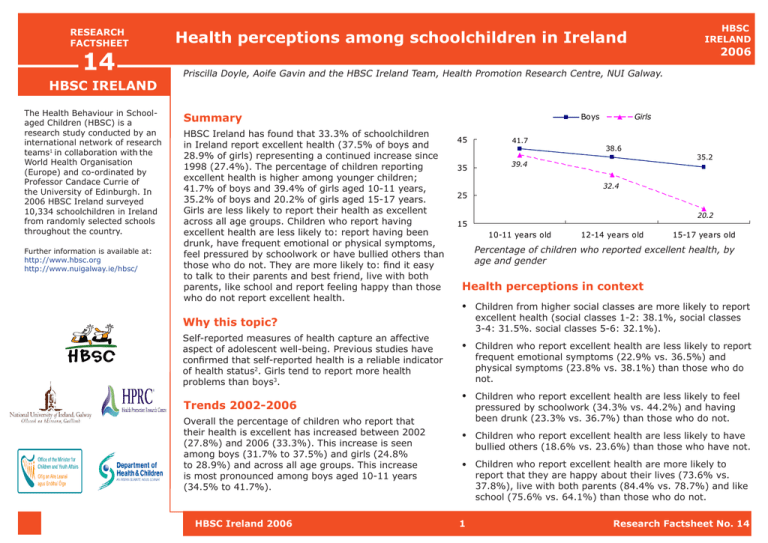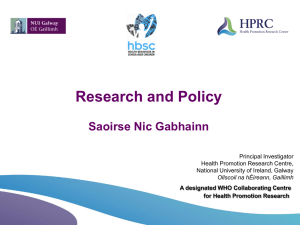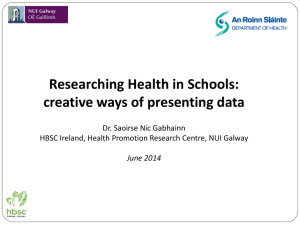14 Health perceptions among schoolchildren in Ireland 2006
advertisement

RESEARCH FACTSHEET 14 HBSC IRELAND The Health Behaviour in Schoolaged Children (HBSC) is a research study conducted by an international network of research teams1 in collaboration with the World Health Organisation (Europe) and co-ordinated by Professor Candace Currie of the University of Edinburgh. In 2006 HBSC Ireland surveyed 10,334 schoolchildren in Ireland from randomly selected schools throughout the country. Further information is available at: http://www.hbsc.org http://www.nuigalway.ie/hbsc/ HBSC IRELAND Health perceptions among schoolchildren in Ireland 2006 Priscilla Doyle, Aoife Gavin and the HBSC Ireland Team, Health Promotion Research Centre, NUI Galway. Summary HBSC Ireland has found that 33.3% of schoolchildren in Ireland report excellent health (37.5% of boys and 28.9% of girls) representing a continued increase since 1998 (27.4%). The percentage of children reporting excellent health is higher among younger children; 41.7% of boys and 39.4% of girls aged 10-11 years, 35.2% of boys and 20.2% of girls aged 15-17 years. Girls are less likely to report their health as excellent across all age groups. Children who report having excellent health are less likely to: report having been drunk, have frequent emotional or physical symptoms, feel pressured by schoolwork or have bullied others than those who do not. They are more likely to: find it easy to talk to their parents and best friend, live with both parents, like school and report feeling happy than those who do not report excellent health. Boys 45 41.7 35 39.4 Trends 2002-2006 Overall the percentage of children who report that their health is excellent has increased between 2002 (27.8%) and 2006 (33.3%). This increase is seen among boys (31.7% to 37.5%) and girls (24.8% to 28.9%) and across all age groups. This increase is most pronounced among boys aged 10-11 years (34.5% to 41.7%). HBSC Ireland 2006 38.6 35.2 32.4 25 20.2 15 10-11 years old 12-14 years old 15-17 years old Percentage of children who reported excellent health, by age and gender Health perceptions in context • Children from higher social classes are more likely to report excellent health (social classes 1-2: 38.1%, social classes 3-4: 31.5%. social classes 5-6: 32.1%). • Children who report excellent health are less likely to report frequent emotional symptoms (22.9% vs. 36.5%) and physical symptoms (23.8% vs. 38.1%) than those who do not. • Children who report excellent health are less likely to feel pressured by schoolwork (34.3% vs. 44.2%) and having been drunk (23.3% vs. 36.7%) than those who do not. • Children who report excellent health are less likely to have bullied others (18.6% vs. 23.6%) than those who have not. • Children who report excellent health are more likely to report that they are happy about their lives (73.6% vs. 37.8%), live with both parents (84.4% vs. 78.7%) and like school (75.6% vs. 64.1%) than those who do not. 1 Research Factsheet No. 14 Why this topic? Self-reported measures of health capture an affective aspect of adolescent well-being. Previous studies have confirmed that self-reported health is a reliable indicator of health status2. Girls tend to report more health problems than boys3. Girls ...Health perceptions among schoolchildren in Ireland 70 60 50 40 indicate that strong family relationships are associated with positive self reported health. However, these data illustrate important differences in self rated health by social class, age and gender which require further consideration. The low percentage of girls and older adolescents reporting excellent health is of particular concern and requires the attention of policy makers, practitioners and researchers. 67 57 55 46 42 41 40 38 37 35 33 32 31 31 31 31 30 29 29 29 29 28 28 28 26 25 24 24 24 24 23 22 21 21 21 20 18 16 16 15 14 14 References 12 10 1. Currie, C., Nic Gabhainn, S., Godeau, E., Roberts, C., Smith, R., Currie, D., Pickett, W., Richter, M., Morgan, A. & Barnekow, V. (eds.) (2008). Inequalities in young people’s health: HBSC international report from the 2005/2006 Survey. Copenhagen: WHO Regional Office for Europe. (Health Policy for Children and Adolescents, No. 5). Estonia Canada Belgium (Fr) Hungary Czech Republic Lithuania Romania Turkey Iceland USA Finland Greenland England Wales Malta Russian Federation Latvia Scotland Ukraine Belgium (Fl) Denmark Portugal Ireland Netherlands TFYR Macedonia Israel Greece Slovakia Croatia Switzerland Slovenia Sweden Norway Bulgaria Poland Luxembourg Spain Austria Germany France Italy 0 2. Idler, E. & Benyamini, Y. (1997). Self-rated health and mortality: A review of twenty-seven community studies. Journal of Health and Social Behaviour, 38, 21-37. Percentage of 15 year old children reporting excellent health, by country • HBSC Ireland is funded by the Health Promotion Unit of the Department of Health and Children. We would like to thank all the children, teachers and schools who participated and acknowledge the contribution of our colleagues in the Health Promotion Research Centre, NUI Galway. All factsheets and other HBSC publications and reports can be downloaded from our website: http://www.nuigalway.ie/hbsc Contact us at: hbsc@nuigalway.ie 3. Laftman, S. & Ostberg, V. (2006). The pros and cons of social relations: an analysis of adolescents’ health complaints. Social Science & Medicine, 63(3), 611-623. Children who report their health as excellent are more likely to find it easy to talk to their mother (87.1% vs. 77.5%), father (74.8% vs. 58.6%), and best friend (89% vs. 87.1%) than those who do not. International Fifteen year old schoolchildren in Ireland (boys and girls together) are ranked 21st among 41 countries in Europe and North America with 28% reporting excellent health. Overall 40% of 11 year olds (ranked 20th) and 35% of 13 year olds (ranked 18th) report their health as excellent. Implications The percentage of young people in Ireland that report excellent health has increased since 2002 and can be considered to be midrange when compared to other European and North American countries. These data HBSC Ireland 2006 This factsheet was prepared by Priscilla Doyle, Aoife Gavin, Siobhan O’Higgins, Graham Brennan, Pauline Clerkin, Aingeal de Róiste, Colette Kelly, Michal Molcho, Brenda Murphy, Larri Walker and Saoirse Nic Gabhainn. 2 Research Factsheet No. 14

